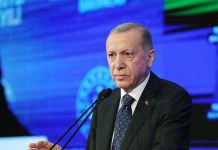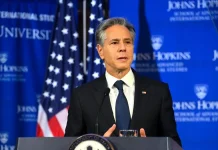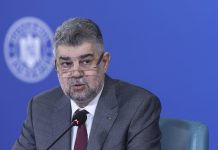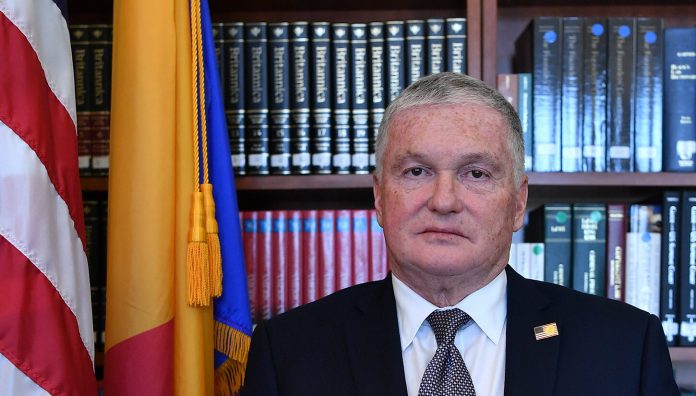Dan Turturică: Mr. Ambassador, many years ago when you and your family left Romania, the idea, the prospect of a Romanian-U.S. strategic partnership seemed utterly impossible; today it is a reality. However, it can be very easy for us to forget how hard it was to get this point. Especially for the younger generation, there is a temptation to take this partnership for granted. For this reason, I would like you to remind us: what’s in it for the U.S. and what’s in it for the Romanians, in this partnership?
Ambassador Adrian Zuckerman: Dan, first of all, it’s great to see you today.
DT: Thank you.
AZ: Let me answer that in a sort of round-about way, since you mentioned my childhood. As you know, I was born in Bucharest more than a few years ago. My family and I escaped communism, when I was nine years old. It was a horrific time and I was fortunate enough to come back here a year ago as the U.S. Ambassador, appointed by President Trump.
In the interim, the story has to begin after World War Two, when the communist regime absolutely destroyed this country. In 1989, the revolution occurred and many other countries prospered, eastern bloc countries, prospered a lot more. The revolution in Romania, unfortunately, has not been completed; there is still a way to go. But there have been great advances made and great advances are being made every day.
I think Romania is a better country today, I think the advances that have been made this year, in terms of economic development, military defense cooperation, and social issues, rule of law issues, have been tremendous. I credit the current government with doing that and tremendous progress has been made. I would say that this year there has been more progress made since the revolution. We can discuss some of those issues in more detail if you want …
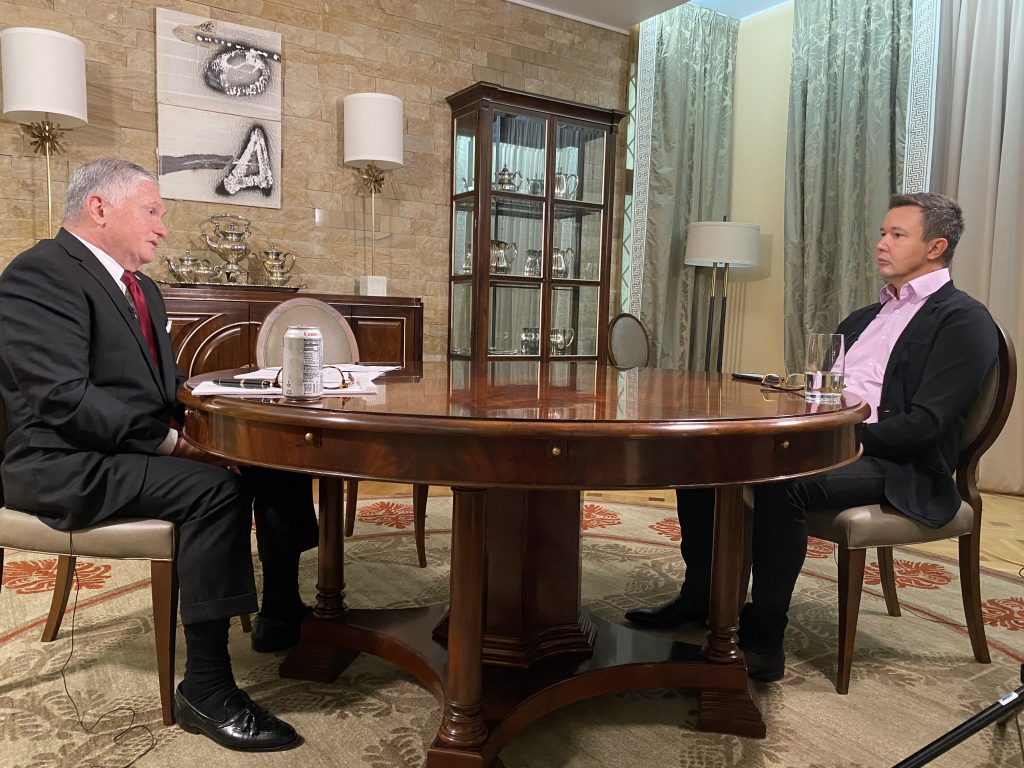
DT: Sure.
AZ: But I want to reassure you and all of your viewers that Romania has no better friend than the United States and the people of the Unites States, and one of the great concerns for the United States is maintaining and sustaining the integrity – the border integrity and social integrity – of Romania and supporting the people of Romania, elevating their standard of living and making sure it continues as a very, very prosperous and independent country in the future.
DT: There is a saying, “There is no such thing as a free lunch,” and people always wonder, “What’s in it for the U.S., in this partnership? Why are they interested in Romania, in this partnership, and also, what is Romania’s benefit in it?”
AZ: I think there’s a tremendous symbiotic relationship that exists today between the United States, Romania, the European Union, and NATO. Romania is a key player on the eastern flank of Europe; along with Poland, they are the two lynchpins to the security of Europe. Romania is an oasis of freedom and great potential economic prosperity. There’s increasing trade with the United States, it’s a base for economic development in Europe, and the best ally the United States could have is a strong economic ally as well as a strong defense partner. I think we are seeing both of those things in Romania, and that is improving.
Economically this year, we’ve commenced a number of very, very substantial projects. One is the Cernavoda nuclear reactor redevelopment. We are leading the refurbishment of one reactor and the building of two new reactors at Cernavoda. There will be Romanian content, French content, and Canadian content, and it’s all being led by a U.S. company. Previous to that, there was a contract there by a Chinese company called CGN, China General. Like most other Chinese companies that are active internationally, it was indicted for fraudulent and corrupt practices and the Romanian Government terminated their contract and agreement with them at Cernavoda earlier this year.
DT: How hard was it to change the companies involved in this contract, because at one point, for us journalists, it seemed like a done-deal with the Chinese. It was hard to change that contract and get partnerships with Western allies?
AZ: I think that the Orban Government and President Iohannis were very supportive of this change. It’s been a pleasure dealing with them this year, and also nothing happened with the Chinese company there for several years. We were able to approach the Orban Government and discuss a business-like plan to effectuate the refurbishment of one reactor and the building of two new ones, fairly quick for this type of work process.
We also recently signed a 7-billion-dollar financing package with the Export-Import Bank of the United States to help finance this work. Other participants in the project will also contribute equity and debt to finance the project. It’s going to be a terrific project that’s going to come on line very, very quickly for this type of work. When it’s finished, it will provide approximately 40% of all of the electricity consumed by Romania, which is a tremendous number. As you may know, but some of the viewers may not know, Romania is current the number two oil and gas producer in Europe. I think when this project comes on line, meaning Cernavoda, and also when the Black Sea oil and gas pumping stations come on line, Romania will become the number one energy producer and exporter in Europe. It’s a great place for Romania to be.
DT: When do you estimate the Cernavoda project will be completed?
AZ: The refurbishment of the first unit probably within three or four years, and the other units within two or three years after that. It’s a complex and sophisticated project, but all three reactors should be up and running within, at most, ten years, probably approximately seven or eight.
DT: You mentioned a very important project, the extraction of Black Sea gas, which after a very good start, after the discovery of vast resources, unfortunately it stalled. We know part of the reason. It was Dragnea’s government’s actions, its meandering of changes in the law and decisions that were not well received by investors. However, the gas is still there. How does it look, from the perspectives of the American companies involved in the project, the chances to restart it? Are we going to see, in the end, Romanian-American cooperation in this field, or does it look like it might suffer a reset and start again with other partners?
AZ: I’m very bullish, as they say in America, on Black Sea oil and gas production. As we speak, there’s a company called BSOG, which stands for Black Sea Oil and Gas, which actually already is working on putting in an underwater pipe to connect the off-shore extraction platforms to the on-shore facility. They anticipate being able to export the gas from the Black Sea to different areas in Romania and abroad starting in the second half of 2021.
The biggest field, the Neptune Deep field, has had slower progress, mostly …
DT: You’re talking about the one Exxon is involved in?
AZ: That’s correct, that’s the one Exxon is involved in.
… mainly because of the adverse effects of the law past previously. We are hopeful that the Orban Government and the Parliament will address these laws and change them next year, so as to incentivize Exxon and its partners, including RomGas, in producing and extracting gas from these fields, which are very, very lucrative and it would address a lot of the needs of not just Eastern Europe, but by doing so could alleviate the demands of Western Europe as well.
For those of you who may not understand, Russian gas production is being used as a weapon to supply countries in Europe that they favor, to influence policies, or are being cut off at its whim. The Russian gas company, GazProm, is trying to use its availability of gas to facilitate Russian foreign policy and European gas independence is one of the issues the United States and its European allies have been working on very diligently over the last few years so as to remove that pressure from European states.
DT: In this respect, Poland was able to take important steps ahead. In this context, I want to refer to the opinions of some economic and political analysts from Romania who said that even the security, the military security of the Black Sea, would be enhanced by having American investments in the off-shore gas exploration. Do you agree with this view?
AZ: Completely. As we look at the current situation, the United States and its European partners have opposed the completion of NORDSTREAM 2, which would allow Russia to pick whom to deliver gas to and whom not to deliver gas to. Similarly, the Russians are now trying to build TURKSTREAM 2, to have another avenue of gas delivery, and it is being used as a weapon.
We have to remember that since the Russians invaded Crimea and Ukraine, the Black Sea has been militarized to a very great degree by the Russians. What used to be the Russian fleet, prior to the invasion of Crimea, they had a lot of old and rusted naval ships there. It is now a state-of-the-art fleet. They have very aggressive military exercises in the Black Sea, wherein they declare a lot of areas in the Black Sea off-limits to commercial traffic. They try to control that and muscle other countries’ commercial as well as military forces out of certain areas of the Black Sea. It is a situation that we will not tolerate or countenance. And it all comes back to being able to influence countries by the strategic use of energy resources. Having substantial gas produced by Romania will eliminate a lot of this pressure.
DT: Because you touched on this aspect of military and security challenges in the Black Sea, how would you assess the progress that Romania has made in terms of the military preparing for its defense? We’ve known for a long time the defense of the Black Sea coast of Romania was a weak point. Definitely we’ve made some of important steps, acquiring a lot of military equipment. But let’s say, on a scale, of where we’ve been and where it would be ideal to be, where are we now? Are we mid-way?
AZ: The defense cooperation between the United States and Romania, and NATO, has never been better. I think the bilateral relationship between the United States and Romania, when it comes not just to military cooperation but economic development and other issues, has also never been better. Enormous strides have been made this year. Aside from the defensive missiles at Deveselu, the Aegis missiles, we are in the process of modernizing Romania’s armed forces, its military, its land forces, as well as its air forces and naval forces.
The communications between the Romanian Ministry of Defense and the Department of Defense have never been better. We were able to establish, this year, regular weekly or bi-weekly communications between the two departments at a very, very high level. We were able to have Romanian service people serve with American service people, again they are involved with senior people in Europe, so that there is great cooperation.
And the modernization of Romania’s equipment assures interoperability with NATO and U.S. materials, and I’m referring to F-16s, I’m referring to helicopters, I’m referring to drones, I’m referring to all kinds of equipment that is necessary to make sure that, as allies, we stand shoulder-to-shoulder with no issues between us.
The United States, I’ve said it previously, will not tolerate any insecurity or any threats against Romania’s border integrity.
DT: Is there any landmark, in terms of military procurement, we should look forward to? We’ve seen the acquisition of the Patriot, we’ve negotiated the HIMARs system. Is there anything, other important element, that is in the pipeline?
AZ: In terms of weapons systems, I think there are a number of diverse weapons systems; I’m not going to discuss those today.
One of the points I want to make about the Patriot system, that’s going to be delivered and installed in Romania, is the same caliber that the United States uses and is the latest and highest technology. The same thing is true for the HIMARs system and the same thing will be true for the other high-tech systems that will be deployed in Romania.
Also this year we continue to deploy American troops on a rotational basis to Romania. The number of rotational troops will increase as we move forward, and again, this is the United States’ strong commitment to Romania’s independence and border integrity. Romania along with Poland are the lynchpins in Europe’s defense on its eastern border.
DT: So you are optimistic that in the foreseeable future you will be able to unlock the no-access strategy Russia is working on in the Black Sea?
AZ: I think Black Sea security, Black Sea regional security, is a very complex issues, because as you know, the Black Sea is surrounded by any number of states, not just on the western side with Romania, Bulgaria, Turkey, Ukraine, but also on its eastern side. So the challenges to transportation, commercial as well as access to the Black Sea by other countries’ military craft, has to remain unimpeded, and we will assure that.
DT: Now I would like to turn to the topic of economic cooperation, because of course, it is extremely important, it is intertwined with security issues. You announced recently the project regarding the corridor between Gdansk in Poland and Constanta as part of the so-called Via Carpathia, part of the Three Seas Initiative. Then, you added some details, and mentioned that there are, actually, joint teams working from the Embassy, from the Ministry of Transportation deciding the exact segments in Romania of this project. Are you able to tell us now more about the stage in which this project is?
AZ: This project, in my opinion, is one of the most crucial projects that Romania could undertake. The benefits to the Romania economy of the Via Carpathia, which will run from Constanta to Gdansk, and also the accompanying railroad, which we refer to as Rail to the Sea, are crucial. As you, I am sure, know already, Constanta is the best deep-water port on the Black Sea. It has a limited capacity, not because of the facilities at the port, but it has a limited capacity because of the infrastructure servicing the port. Enough containers cannot get in and out of the port in order to increase the capacity of the port.
This road and railroad will address those issues, will allow a much quicker and better exit and entry to the port all the way to the Baltic Sea. This has been a dream, not only for Romania, but Poland, for quite a number of years. The benefits to the Romanian economy and the Polish economy and to the economies of Eastern Europe will be absolutely remarkable. The road will not go through Ukraine, the road will go from Constanta to Bucharest up along Bulgaria, up next to Hungary, through Hungary, through Slovakia, I think, and then to Poland.
That route will allow other cities to connect into this sort of commercial spine, so that they develop. As you may know, I was recently in Iasi. I saw the offices of Amazon, I saw the offices and the factory of a company called BorgWarner, which makes injection systems for automotive engines, truck and car engines. I was at the Agricultural University in Iasi. Everybody says that Iasi is an island. The reason it is an island is that it has an inferior infrastructure. For an executive at a company in Iasi to get to Brussels or to Luxemburg, it takes three flights. To drive is even worse. So what should be a two or three hour trip becomes a day trip. The city cannot grow and one of the points that was made is that Iasi is no longer competing with Cluj or Bucharest or Timisoara. Iasi is competing now with Madrid, Berlin, London, Paris, in order to sustain that competition.
This type of infrastructure is desperately needed. Iasi needs to be connected by a highway and a railroad to this type of north-south main highway, railroad, in order for Iasi to grow, which allows to grow. Once these projects are undertaken, it will create a huge economic boom, and Prime Minister Orban announced, within the last several days, his support for a highway to connect Iasi to this north-south highway. I think there will be other similar projects underway.
I’ve been meeting with Transportation Minister Bode. We’ve been discussing the routes of the highways. We’ve discussed financing. We’ve discussed a lot of other issues that are pertinent to this, which are very important. He has a working group, the Embassy has a working group and we’re proceeding to try to finalize these plans and actually start work as soon as humanly possible.
DT: When do you expect to finalize the plans?
AZ: I think it will be several months, unfortunately, but I think the plans need to be done correctly, otherwise disaster befalls.
DT: But as I understand, the backbone of Via Carpathia in Romania would still run mainly east to west, from Constanta to Bucharest then west or northwest to a connection through Hungary. The backbone it is going to be the Bucharest-Pitesti-Sibiu corridor or it will be an alternate route to the Bucharest-Sibiu highway, that is being built right now as we speak?
AZ: I think that’s a very good question. That’s one of the issues we are looking at. Our working group is reviewing that with Transportation Minister Bode’s group and what I’d like to say is “Yes” to everything, because what is needed in Romania is not just one highway, a number of highways …
DT: Since you mentioned Iasi, in order to connect it to Via Carpathia it needs to be another project.
AZ: You are absolutely right. There are number of other major infrastructure projects that have to be undertaken. Prime Minister Orban’s Government is committed to doing them, they are committed to undertaking more projects, they’ve realized the crucial necessity and importance of these types of developments which have been stalled for many, many years and perhaps the ones that were not stalled were not even contemplated for the development of Romania.
I believe Romania has a huge, huge potential if it is allowed to grow in a free and democratic fashion. And what I mean by free is a free market, where the government steps back and lets the free market proceed and grow. I think Romania can be one of the leaders of Europe in a very short time if it is allowed to do so.
DT: As we discuss about Via Carpathia, and the railway link, is there already interest from American banks and other financial institutions to finance these projects?
AZ: I think there’s a very high likelihood. The Chairwomen of ExIm Bank will be here next week, and this is one of the projects we will be discussing. As I mentioned earlier, ExIm Bank committed for Cernavoda up to seven billion dollars in financing. This will be one of the projects we will be discussing with regard to Romania’s economic development.
But the real answer to your question is not so much the financing piece, but when we look at why the projects were not done in the past, you need to look at what has been happening in the country for the last seven, eight years, nine years, and especially last two or three years. 2019, 2018, 2017, the fraud, the corruption, the lack of transparency has to end.
There has to be accountability, and there has to be transparency, and the rule of law is paramount. None of these things can happen unless we adhere to the rule of law. And the rule of law has to be fair and equal for everybody. You need an independent judiciary, you need full access to the judiciary in order to get investment, in order to get financing, in order to get any of the other things that are so desperately needed here.
People need to understand that the endemic corruption of the past is going to end. Unless that ends, and we have rule of law and transparency, none of these things will be completed in a successful manner. The corruption of the past has to end. Mr. Dragnea is in jail, there are others who worked with him, who helped him, I refer to the red barons, but there are others. As President Iohannis said, the revolution was not completed, the revolution has to be complete. The rule of law has to prevail in Romania for Romania to achieve its rightful place in Europe.
DT: This upcoming Sunday we will have general elections in Romania and it’s a good moment to reflect a little bit on what happened during the last electoral cycle. For the first three years, we know already the amount of damage that was done to the institutions of justice that have to ensure the rule of law. How do you feel about the progress that has been made in the last year since, as you mentioned, Dragnea was put in jail?
AZ: I am very optimistic. I think they’ve made a tremendous amount of progress. I think Interior Minister Vela, I think Justice Minister Prediou have worked very hard to achieve that. I think, based on my discussions and meeting with the Justice Minister, shortly after my arrival here, it took him several months to refill positions in the Justice Ministry that were decimated by the prior government. We could not have meetings with him because he did not have the staff to do it. Similarly, I know the Interior Minister Vela went through the same thing.
I think recently, as you have seen, a couple of weeks ago, the Interior Minister launched raids against organized crime, human traffickers and others, in eight or ten cities around Romania. Six, seven hundred people were detained, and they are continuing. He called it “Z-Day,” referring to Zero Tolerance – perhaps he was referring to me, for Zuckerman, I don’t know – but we announced a plan to combat human trafficking, which is a terrific scourge. It is a disgrace to this country, there is no place for it in Romania and it has to end. I think the Interior Minister and the Justice Minister have put up a program. We are continuing to work with them, diligently.
Many arrests have been made, and many more have to be made to get rid of the clans, organized crime, and human traffickers in Romania. I think they (Vela and Prediou) are very, very serious, I think they have accepted the plan suggested by the State Department, with regard to eliminating and combatting human trafficking. They are working together with our law enforcement groups, very closely, and we’ve made tremendous progress in those areas. The law enforcement collaboration has been absolutely superb.
I also committed to Prime Minister Orban, as well as Ministers Vela and Prediou, that we will make available all law enforcement assets of the United States to help Romania fight, not just human trafficking, but organized crime, in this country.
DT: Combatting human trafficking was one of the most important topics you touch on in almost all of your public appearance. I started to look more on this topic after seeing how much you insisted, and that’s when I discovered we are in a terrible position in the report the State Department releases every year.
We are on the Tier 2 Watch List for a second year, so unless this progress you mention is going to be considered sufficient by the State Department, there is a risk for Romania to slip into Tier 3. If such a thing would happen, it would also have an impact on the financing of different projects that you mentioned before.
Maybe you would like to elaborate a little bit, because still a lot of people in Romania don’t understand the seriousness of this issue, that the authorities are still not doing enough to address.
AZ: If Romania slips into Tier 3, it will affect all financing, lending, and other similar programs that the United States helps Romania with. It’s a Congressional law and it’s meant to be a deterrent to human trafficking, which should not exist. It’s a disgrace and a scourge and I feel very strongly about that. It should certainly not exist in a civilized country like Romania.
The good news, here, is that we have had many, many meetings with Minister Vela, Justice Minister Prediou, and others, and we have accepted the plan proposed by the State Department to address human trafficking, that should be implemented. I brought a copy with me. There is a great deal that Romania needs to undertake to elevate itself from the Tier 2 Watch List to Tier 1, where Romania should be.
DT: Is that the plan mentioned in the report?
AZ: Yes, it’s mentioned in the report and are suggestions as to what Romania should do.
DT: There are quite a lot of suggestions; the list is pretty long.
AZ: The two main themes, again – there are a lot of specific suggestions – but the two main themes the rule of law – expedited trials, independent judiciary, arresting and trying the perpetrators – and also assistance to the victims, which I have not mentioned, and we have been focused on that.
And I’m happy to say that we’ve been working on a plan, which I alluded to a week or so ago, two weeks ago, when the new mayor of Bucharest visited me at the Embassy and I want to disclose now – we will make public in a week or so – to provide for housing and shelters in Bucharest for trafficking victims.
And we’ve been working with Preafericite Daniel, ANITP, and we’ve been working with the city of Bucharest, which has also started its own anti-trafficking task force. This is a very serious, serious issue, and organized crime and human trafficking have no place in Romania.
DT: So to make things even clearer, if this progress is not considered enough, even the financing of the Cernavoda plant would be in jeopardy. Am I right?
AZ: In theory, you are correct. I am hopeful, and I trust in the good will of people like Prime Minister Orban, President Iohannis, Minister Vela, Minister Prediou, in implementing and proceeding with these plans. I don’t see why they would not, and it’s an effort that should be undertaken by all.
DT: In the Human Trafficking Report, one of the problems mentioned is the corruption, the connections between organized crime and the people who should go after them, who should indict them or judge them. Do the Romanians authorities unterstand how serious is this problem? If the people who are committing these crimes find protection from within the ranks of the central administration of the Minister of Internal Affairs, or the prosecutors and judges, all the efforts will be in vain. What were the answers of those responsible when you discussed this topic?
AZ: I think it’s an unfortunate situation. I think to answer your question in context, again, we have to go back 30 years, or 31 years almost now, to the revolution, when the communists were gone. The communist government absolutely eviscerated and destroyed this country for generations. And unfortunately a lot of the remnants of that still exist.
A lot of progress has been made, but not sufficiently, and I think a lot of the remnants exist in various parties, and I think that, as Romania moves forward, any corrupt individuals have to be removed from any position of authority and they have to be prosecuted to the full extent of the law, which again, comes back to the issue of an independent judiciary and the rule of law, which was disregarded under Dragnea’s regime, of the prior government. The rule of law, and many laws, criminal laws, were weakened, some removed, and that cannot stand. Many are trying to reinstate the prior laws so that the rule of law can be re-enforced, and people that are corrupt can be fully prosecuted.
DT: The fight against corruption was for many years a subject of cooperation between the U.S. and Romanian authorities. You also mentioned in the past a roadmap agreed between the Department of Justice in the U.S. and Ministry of Justice in Romania. What is the status of that roadmap and the objectives to reach? How far and how long are we into this process?
AZ: Well, the group in the U.S. dealing with this at State is called J/TIP. And the Human Trafficking Report, it was set forth. The Minister of Justice accepted the recommendations and they are being fully implemented. I think the statistics for arrests and prosecutions this year, as compared to last year, are increasing dramatically, which I, frankly, think is remarkable, because we have not yet discussed the elephant in the room, which is COVID. So, given the background of COVID, to see all of the positive steps taken by the Justice Minister and the Interior Minister, to enforce and follow this roadmap so far, is remarkable.
DT: You mentioned earlier that in order to get access to financing and to be able, finally, to build the projects that Romania so desperately needs, the fight against corruption is crucial. In this context, the projects that we are talking about, do they have any chance to be accelerated in the coming years? Because the fight against corruption was one of the main arguments that were given to all the journalists when we were asking, “What needs to happen in Romania to get more U.S. investments?” Are we at the point where we have done enough to see an acceleration of U.S. investment in Romania or it’s still a work in progress and that turning point hasn’t been reachhed yet?
AZ: I’m not sure what doing enough really means. I think this year, in terms of economic progress, if you look, not just at the military defense-related projects, which are very, very substantial, but you look at projects like Cernavoda, you look at projects like the Constanta to Gdansk highway and railroad, and there are other projects that are also being contemplated, it’s been huge. I know infrastructure construction has been one of Transportation Minister Bode’s goals; they’re working on a variety of projects. But in terms of getting more U.S. investors here, it’s a process.
I am very much involved with the American Chamber of Commerce here, which is a terrific group, and there are a lot of American companies here already. For example, Coca Cola is here, Pepsi Cola is here, a variety of advisory companies, accounting companies, like PwC (PricewaterhouseCoopers). You have pharmaceutical companies here, you have a lot of technology companies here. And speaking of technology, Cluj and Bucharest, and especially Cluj, is a destination point for Europeans to come to Romania to work in the technology sector.
Aside from that sector, in Cluj and Bucharest as well, a lot of people, Romanian people, are leaving Romania, because not so much they can’t find a job or the standard of living, but they lost hope that tomorrow will be better for them and their families. I think that once these programs that we have been discussing are allowed to ripen and progress, I’m very hopeful that the people who are leaving, who are the people that this country, Romania, needs the most, will come back, because they are not just the educated and the professionals, but also the entrepreneurs, the people that have the courage to seek a better life for themselves and their families, in other places in Western Europe, the U.S., and other countries.
So I am hopeful that once we allow a free-market Romania to take hold – and that can only happen if we have the rule of law and an independent judiciary, which I think every ambassador to this country, for the last 20, 30 years, has been saying – we can achieve that, and that’s crucially important.
There are a lot of companies here, they need to expand. I mentioned earlier the Amazon model, which is a true story in Isai. They want to do more. They are hampered, they cannot do more because people do not want to go there because of the limitations of infrastructure and travel as a result of that. Same thing with BorgWarner, same thing with a lot of other companies in a lot of different cities.
DT: So, to understand exactly, you say if Romania continues on this path, consolidating the rule of law and repairing the damage done to judicial institutions, we can expect to see American banks or American financial institutions financing big projects like highways, like railways, and see American companies coming to Romania to work on these projects? Is this certain?
AZ: Well, nothing in the world is certain, but let me give you two more examples. One, when this government took over last November from the prior government, I was advised by Finance Minister Kitsu that the prior government was keeping two sets books. They had not paid bills for over a year, and these were bills for everyday services rendered to the government. Who knows what else they were doing? Who knows what else the monies were being used for? In the same vein, the former mayor of Bucharest had created 21 or 23 companies that over the last two, three, four years, there were, I believe, two court orders to stop these companies that they were creating illegally and they should be put out of business. That did not happen. These companies still continue.
On top of that, and in the same vein, there are over 1,200 wholly-owned state and municipal companies in Romania. Another several hundred – three, four, five hundred companies – that are partially owned by the state and municipalities, and the PSD Government passed legislation which, because they control Parliament, prevented privatization. If you don’t privatize these companies, you stymie competition, you do not have a free market, nobody can compete with them. Who’s going to compete with the government? You can’t. They’ll undercut prices, they will scare the opposition; you cannot compete.
Also, aside from limiting the efficiency of markets and (limiting) creating competition, they are also a repository for political patronage, they encourage corruption, and they will keep bad habits continuing. If you have a public company (meaning a publicly-traded company, not a state-owned company), they are subject to the rule of law, they are subject to transparency, they are subject to innovation, creativity, they will build bigger, they will have good plans, and they will improve Romania.
So this is one of the issues that has to be addressed. And again, this comes back to the rule of law and transparency. We cannot keep feeding corruption and political patronage in this country. It will not achieve its highest potential if that goes on.
DT: I know you’ve been here for over a little over a year …
AZ: A little less than a year. It will be a year in the middle of December. Another two weeks and it will be a year.
DT: Less than a year, sorry. But, the Embassy was here even in the first three years of this electoral cycle and I’m curious if you know, if it was reported to you, what were the answers from the former (Romanian) officials when they were asked by members of the U.S. Embassy about these issues – ”Why don’t you do more against corruption? Why did you change the justice laws for the benefit of corrupt people?” What answers did U.S. officials get, again, from the officials of the previous government?
AZ: Well, some were non-answers. Some were promises to address issues and the promises were never fulfilled. Some were just nasty answers to mind your own business. I think what I am saying today is really nothing new. I think every American ambassador for the last 20, 30 years, has been saying the same thing. We look at issues to advance democracy, to advance human rights, where we think our allies should be.
As an example, free-market economies, as we have in the United States, has created more wealth around the world than any other economic system, ever. It has lifted people out of poverty, it has enriched countries and individuals, and people as a whole, and eliminated issues of corruption. I don’t mean to pound the rule of law and transparency, but it needs to be implemented her across the board here, without exception.
DT: Still, as we have seen over and over again, a lot of Romanians are still voting for politicians and parties that do not obey these essential principles and values. And considering, again, that in a few days we’ll have general elections, what would you tell these people who continue to vote for politicians who ignore the public good?
AZ: You know, we don’t pick winners and losers in the elections in any country, especially in Romania. We speak out for issues that are important to the United States. Since the first day I arrived here, I have spoken out on the very issues that we discussed earlier. I think we believe in people’s right to self-determination and to do what is in their best interest. We hope that people pursue the democratic process and seek and achieve a better Romania for themselves and for their children. I think this is a moment of great hope and expectation, and I think, since I’ve been here, as I mentioned earlier, I think a tremendous amount has been achieved. So, I am hopeful that trend will continue into the future.
DT: It’s been a tough year. COVID really changed a lot of things all over the world, and I wanted to ask you, how is the cooperation between Romania and the U.S. in combatting COVID so far, and maybe what are some of the elements in the future cooperation?
AZ: Well, at the beginning, and unfortunately the beginning was too long ago for this scourge, and we talk – and before I address that, we all talk about COVID and what Romania should do, or what the U.S. should do, or what other countries should do. But we never talk about the source of COVID: China was the source of COVID! China is the problem here! Everybody seems to forget that, and we can talk about China in other contexts. But this whole problem goes back to China. China has created a problem that has turned the world’s economies upside down. It has turned people within countries against themselves with respect to what may be or not be the best solution to keep their people safe. It has turned countries against each other, closing their borders in the attempt to keep their people safe. And we all discuss what the best remedy should be, but we always forget it came from China, it came from Wuhan, it probably came from a lab in Wuhan, so we need to keep that in context.
Number two, there was great support between Romania and the U.S. in the early days of COVID, as there is now. The U.S. helped financially. American companies in Romania gave millions in cash and other contributions to the Romanian people. The American Government gave various cash, cash-equivalents, as well as various Personal Protection Equipment to Romania and assisted the Romanian people in other respects. The Romanian people, in a gesture of great – for me, it was just a tremendously generous gesture – sent doctors and professionals to the United States to help people there with COVID, to share the experiences they learned here. And currently, everybody’s working on a vaccine. From what I understand, there are several vaccines that are ready and I think they are in the process of being distributed. My understanding is that the first batch of vaccines will be distributed within weeks and hopefully people will start being vaccinated against COVID in the next few weeks which hopefully will be the beginning of the end of this terrible problem.
DT: there is another project that needs to be interconnected
AZ: Absolutely.
DT: Is the vaccine going to be available?
AZ: I’ve been advised that we will probably get a vaccine at the Embassy at some point in January they are anticipating, and I will absolutely get a vaccine.
DT: This whole year, there has been this underlying effort of various foreign powers of first of all, denying COVID, then talking about the uselessness of a vaccine. How would you rate our efforts to combat this propaganda efforts, that are actually continuing a tremendous propaganda effort that has been taking place to subvert military cooperation, the NATO Alliance, the trust in state institutions, in democratic processes?
AZ: It’s a terrible problem. I think you have your typical list of malign players, Russia, China, Iran, North Korea, that issue stories about COVID. They try to foment distrust and instability and generate lies. COVID is a problem. Thank God it is not responsible for more deaths than it is already responsible for. Most of the people infected with COVID recover fully, but unfortunately many, many have lost their lives and it’s just a terrible tragedy and my heart goes out to all the families of those people who lost their lives to COVID. It’s just a tragedy and it’s unfortunate that so many of these malign players use this as a destabilizing force to attack democracies in the West.
DT: We are most probably heading towards a change at the White House and I was wondering how this is going to affect your job here in Romania. Are you still going to be the U.S. Ambassador in Bucharest for a while?
AZ: Well, you said we’re heading for a change, but there’s no finality yet. I think one of the wonderful things about the American process is the peaceful transition of power. There are still questions that have been raised with regard to various issues in the election process. I am sure those will be resolved one way or another in the near future and we will have a President inaugurated on January 20th. All ambassadors submit their resignations, which are either accepted or rejected by the Administration that is sworn in on January 20th. Until somebody tells me otherwise, I am still the Ambassador here and I look forward to continuing as such.
DT: Ambassador, you are really involved in what is going on in Romania and the well-being of our partnership, and considering that we are having this conversation just one day before our celebration of our National Day, I would like to invite you, if you have a message, for the Romania people, who, maybe you would want to address in Romanian, a language that you speak very well. I invite you to do so.
AZ: (Translation of Romanian: Congratulations on the 102nd anniversary of the Great Union. From where I stand, I believe Romania has made huge progress this year and I hope it shall further these advances for many, many years to come and it shall occupy its rightful place in the E.U. leadership. Thank you!)
DT: Thank you very much, Mr. Ambassador.
AZ: Thank you, it’s great to be here with you today, Dan


